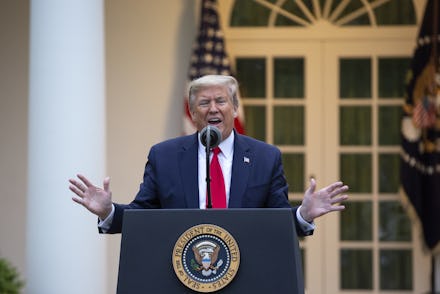The coronavirus task forces Trump created appear to be a total shitshow

When President Trump announced his Great American Economic Revival Industry Groups in the White House Rose Garden on Tuesday, he spent nearly 10 minutes rattling off the names of C-suite executives, big-name "thought leaders" and well-connected political donors joining the roughly 200-person consortium he'd previously dubbed the "Opening Our Country Council." A few days later, members of Congress began receiving emails notifying them that the president had tapped them for an as-of-yet unnamed task force to focus on the "re-opening of America in the wake of COVID-19."
Between the collection of industry-specific groups and the smaller committee of lawmakers, the White House's intent is clear: to present an overwhelming, all-encompassing response to the unprecedented challenge of the coronavirus pandemic — or at least the impression of one. In truth, however, the entire process of assembling the groups and giving the task force an actual, y'know, task, seems to have been mishandled from the start.
According to The New York Times this week, a number of the high-profile members of the industry groups had little, if any, idea that they'd been selected for the president's scheme in the first place.
Networking giant Cisco Systems and McDonald's learned of their inclusion the moment the president mentioned them live on television, per the Times. Pharmaceutical juggernaut Pfizer was reportedly given just one hour's notice that Trump might mention the company during his remarks, and AFL-CIO president Richard Trumka claimed he wasn't asked to join the groups at all, though a spokesperson told the Times that he'd participate anyway "to see if it’s a serious effort."
In an email to Mic, the White House pushed back on the notion that individuals weren't given notification that they'd be included in the working groups.
Complicating matters further is the fact that some business leaders who were game to take part in the president's task force weren't able to do so, thanks to the incredibly slap-dash way the working groups were created. Again, per the Times:
... calls were set up on such short notice that some chief executives were unable to join in. For instance, David M. Solomon, the Goldman Sachs chief, was leading his own quarterly earnings call at the same time as the White House call.
The chief executive of Starbucks, Kevin Johnson, had previous commitments to address employees, and another executive from the coffee chain joined the call, according to a person familiar with the matter. Meanwhile, Jamie Dimon of JPMorgan Chase & Company was also unable to join, according to a person familiar with the matter, but one of his deputies spent 15 minutes trying to patch in to the discussion, ultimately without luck.
Not exactly confidence-inspiring — and the select task force of lawmakers doesn't seem to be faring much better, either.
Just after a characteristically lukewarm tsk-tsking of Trump's overall coronavirus response ("very uneven," she said), Maine Republican Sen. Susan Collins announced that she'd been tapped to join the task force, alongside fellow Republicans like Rep. Steve Scalise (La.) and Sen. Josh Hawley (Mo.). Democrats like Sen. Amy Klobuchar (Minn.) and Rep. Rho Khanna (Calif.) were also asked to join. The problem, however, is that not only does the task force not have a name, it doesn't seem to actually have much of a stated task, either. And so, its members have been left to issue vague statements about what they'd like to accomplish with their participation, rather than what they've actually been charged with doing.
"My highest priority on this task force will be to ensure the federal government’s efforts to reopen our economy are bipartisan, data-driven, and based on the expertise of public health professionals," Virginia Democratic Sen. Mark Warner said in a press release announcing that he'd joined the group. Nevada Democratic Sen. Jacky Rosen meanwhile promised to "bring Nevada's voice to the table as we work to protect the health and well-being of our country."
These are all very nice platitudes, of course, but they don't actually address the issue here: that ultimately, it seems like there's no one steering this pandemic ship. It's like writing up ornate name cards to seat people at a wedding, but once everyone's at their table, saying that it's up to them to cook their own meal.
In the meantime, perhaps some semblance of order will emerge from the chaos as the executives, thought leaders, lawmakers, and other notables realize that it's up to them to actually figure out what the hell they're supposed to do. It certainly doesn't seem like they'll be getting that guidance from the White House.